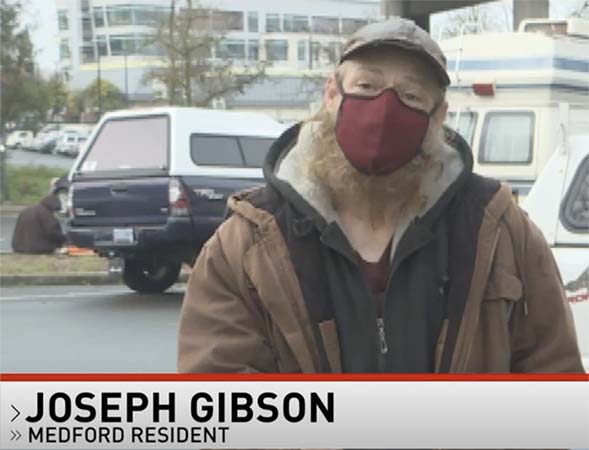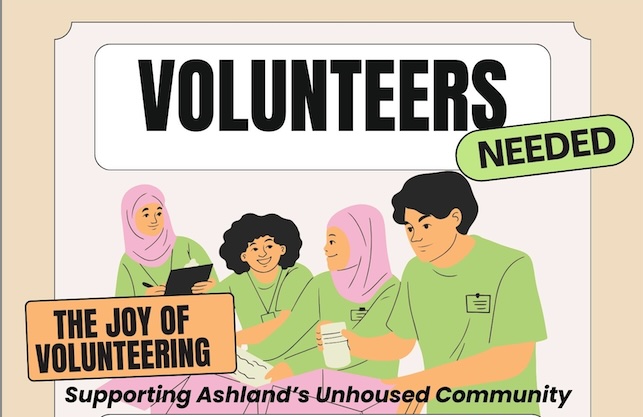by Joseph Gibson, an unhoused resident of Medford, Oregon and Tristia Bauman, Senior Attorney with the National Homelessness Law Center (NHLC).
The City of Medford has presented itself as an innovator in jurisdictional approach to homeless services and enforcement. The city’s local approach to building sanctioned encampments while increasing penalties for anyone living outside of the city-sanctioned sites has influenced cities across Oregon, and even Portland is considering controversial, militarized encampments. But for many individuals living unhoused in Medford like myself, the City’s implementation of its revamped Prohibited Camping ordinance is simply business as usual. And that business is the displacement and criminalization of community members trying to survive brutal conditions this winter.
Medford has already seen its first casualty of this inhumane ordinance. On December 15, 2021, an unhoused man died of hypothermia underneath the 10th street and I-5 bridge. He did not have a tent that night. Medford’s “Prohibited Camping, Lying and Sleeping” ordinance, which passed last spring, makes the mere use of a tent punishable with up to 30 days in jail and a $500 fine. In the hours following the unhoused man’s death, the Medford Police made statements that he was “rather resistant to resources” offered to him by officers, even though the emergency shelter reached capacity that night and he would have been punished for using a tent.
While it seems obvious that banning tents or other shelter in wet and freezing temperatures will inevitably lead to exposure deaths, the City’s victim-blaming comments highlight an emerging trend among Oregon jurisdictions: justifying increased criminalization and enforcement because individuals decline what are often inaccessible and inadequate resource referrals.
The offer of temporary resources, like an overnight shelter bed, cannot be justification for tent bans, displacements, or other policies that impact a person’s ability to stay alive. Emergency weather shelters, sanctioned encampments, and congregate shelters are not a sufficient substitute for actual housing.
The City of Medford’s statements on refusal of services reveals both a misleading narrative and specific legal strategy that Medford and other jurisdictions are taking in response to the Martin v. Boise 9th Circuit ruling and Oregon House Bill 3115. By manufacturing an illusion that individuals are choosing homelessness over available services, cities are enabled to continue enforcement measures and then blame unhoused residents for their trauma, punishment, and displacement. Even death is blamed on “service resistance” rather than the lack of available housing. These jurisdictions attempt to circumvent the ruling in Martin v. Boise by creating straw-man service options to justify their ban on tents and other policies of criminalization.
These supposed “services” offer no real path to housing or stability, but are used to justify government displacement and harassment of anyone refusing these hollow offers. In Medford, the straw-man shelter is an ‘urban campground’ without running water, without close access to public transportation, and located on the site of a now defunct slaughterhouse. Between July and October 2021, Medford forced over 700 hundred people to stay at the Urban Campground, but more than half of these individuals ended up back on the streets before accessing any other form of shelter or housing.
Medford is not alone in this harmful approach. Recent reporting shows Portland City Commissioner Dan Ryan expressing approval of straw-man services “because once we build [temporary villages], then we’ll have places to take people and then if they don’t want to go there, then law enforcement and others have an opportunity to actually do something to move them.”
What is conveniently left out of this narrative is that temporary services do not end homelessness, nor even meet people’s basic needs. There are valid reasons people are unable or unwilling to give up their tents, personal property, and pets for overnight beds in crowded, under-resourced facilities. It should be no surprise during COVID that individuals might be terrified to enter a crowded indoor environment with 50+ other individuals. And, people who want access to even temporary resources are often turned away.
In Medford, I regularly see people with mobility issues denied access to shelters because the facilities can’t accommodate their needs. I see people with mental health diagnoses kicked out of services for symptoms related to their disability. I see individuals with drug dependency unable to get a bed at the single detox center in our county. A referral to these facilities do not justify punishing people for sheltering outside of the facilities when housing is unavailable. A fair system does not require a person to accept resources, regardless of their accessibility or adequacy, or face jail. And the consequence for not using straw-man services should not be death by hypothermia.
By the City of Medford’s own reporting, it’s straw-man services model is not working to meet people’s needs. Of 215 people who received “Prohibited Camping” notices between May 3rd and October 14th, roughly a third of evicted individuals (35%) accessed temporary shelters. The vast majority were cited, threatened, and moved along to face risk of arrest and jail time for use of a tent – or death for not using one. Criminalizing tent use and the ability to stay dry and warm during the coldest nights of winter will only lead to more deaths on the street. We must reject the “Medford model,” and focus on solutions led by and for unhoused communities across the West coast.


